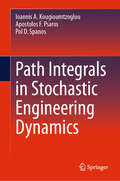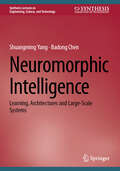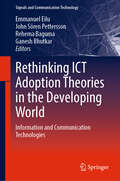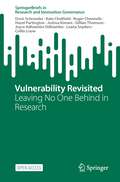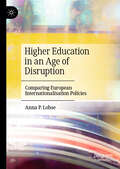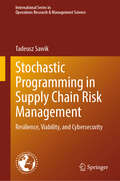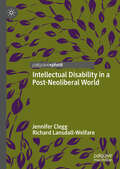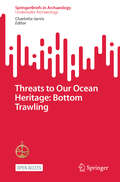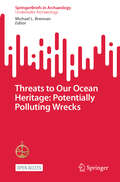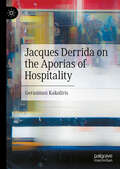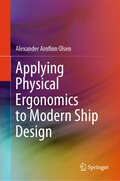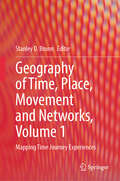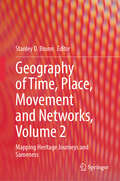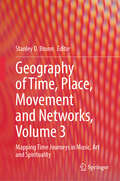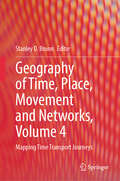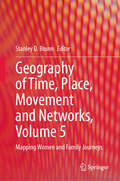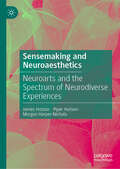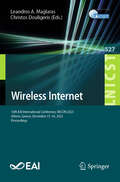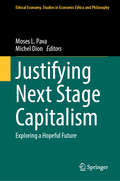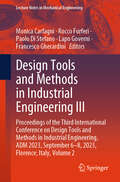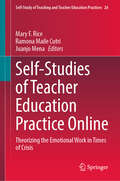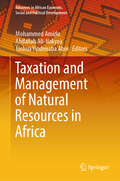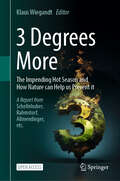- Table View
- List View
Path Integrals in Stochastic Engineering Dynamics
by Ioannis A. Kougioumtzoglou Pol D. Spanos Apostolos F. PsarosThis book organizes and explains, in a systematic and pedagogically effective manner, recent advances in path integral solution techniques with applications in stochastic engineering dynamics. It fills a gap in the literature by introducing to the engineering mechanics community, for the first time in the form of a book, the Wiener path integral as a potent uncertainty quantification tool. Since the path integral flourished within the realm of quantum mechanics and theoretical physics applications, most books on the topic have focused on the complex-valued Feynman integral with only few exceptions, which present path integrals from a stochastic processes perspective. Remarkably, there are only few papers, and no books, dedicated to path integral as a solution technique in stochastic engineering dynamics. Summarizing recently developed techniques, this volume is ideal for engineering analysts interested in further establishing path integrals as an alternative potent conceptual and computational vehicle in stochastic engineering dynamics.
Neuromorphic Intelligence: Learning, Architectures and Large-Scale Systems (Synthesis Lectures on Engineering, Science, and Technology)
by Badong Chen Shuangming YangThis book provides a valuable resource on the design of neuromorphic intelligence, which serves as a computational foundation for building compact and low-power brain-inspired intelligent systems. The book introduces novel spiking neural network learning algorithms, including spike-based learning based on the multi-compartment model and spike-based learning with information theory. These offer important insights and academic value for readers to grasp the latest advances in neural-inspired learning. Additionally, the book presents insights and approaches to the design of scalable neuromorphic architectures, which are crucial foundations for achieving highly cognitive and energy-efficient computing systems. Furthermore, the book introduces representative large-scale neuromorphic systems and reviews several recently implemented large-scale digital neuromorphic systems by the authors, providing corresponding application scenarios.
Rethinking ICT Adoption Theories in the Developing World: Information and Communication Technologies (Signals and Communication Technology)
by Emmanuel Eilu Ganesh Bhutkar Rehema Baguma John Sören PetterssonThis book provides extended frameworks and models to help with the adoption of information and communication technologies (ICT) in developing countries. The book first discusses the extent to which conventional ICT theories can be rigid in nature, often unable to handle the constant advances in technology, and technology adoption, implementation, usage, and disposal, not to mention different needs and cost availability in developing countries. The authors go on to show how new and revised models, tested in many societies in developing countries, can solve this mismatch. The authors provide examples of successful ICT adoption in developing country settings, in the areas of agriculture, culture, forestry, education, economics, health, and governance. The authors also show how techniques from persuasive design, philosophical designs, and motivational designs have been adjusted to facilitate successful ICT adoption, implementation, usage, and disposal in targeted regions.
Vulnerability Revisited: Leaving No One Behind in Research (SpringerBriefs in Research and Innovation Governance)
by Doris Schroeder Roger Chennells Kate Chatfield Hazel Partington Joshua Kimani Gillian Thomson Joyce Adhiambo Odhiambo Leana Snyders Collin LouwOpen access. This open-access book discusses vulnerability and the protection-inclusion dilemma of including those who suffer from serious poverty, severe stigma, and structural violence in research. Co-written with representatives from indigenous peoples in South Africa and sex workers in Nairobi, the authors come down firmly on the side of inclusion. In the spirit of leaving no one behind in research, the team experimented with data collection methods that prioritize research participant needs over researcher needs. This involved foregoing the collection of personal data and community researchers being involved in all stages of the research. In the process, the term ‘vulnerability’ was illuminated across significant language barriers as it was defined by indigenous peoples and sex workers themselves. The book describes a potential alternative to exclusion from research that moves away from traditional research methods. By ensuring that the research is led by vulnerable groups for vulnerable groups, it offers an approach that fosters trust and collaboration with benefits for the community researchers, the wider community as well as research academics. Those living in low-income settings, in dire situations that are summarized with the term ‘vulnerability’ know best what their problems are and which priorities they have. To exclude them from research for their own protection is a patronizing approach which insinuates that researchers and research ethics committees know best. The team from this book have shown that minimally risky and minimally burdensome research tailored towards the needs of highly marginalized and stigmatized communities can be scientifically valuable as well as inclusive and equitable. I congratulate them. Prof. Klaus Leisinger, President Global Values Alliance, Former personal advisor to Kofi Annan on corporate responsibility
Higher Education in an Age of Disruption: Comparing European Internationalisation Policies
by Anna P. LohseThis book investigates European higher education internationalisation policies during a period marked by extreme upheaval due to Brexit and the COVID-19 pandemic. Situating her analysis at the intersection of higher education research and policy studies, the author combines historical and sociological institutionalism to investigate how this time of disruption impacted higher education policies in England, France and Germany. Based on extensive qualitative data derived from expert interviews and document analysis, the study offers timely insights into dynamics of institutional change and stability in higher education governance, as well as implications for the future of cross-border education and internationalisation. The book will appeal to academics and students interested in education policy and the internationalisation of higher education.
Stochastic Programming in Supply Chain Risk Management: Resilience, Viability, and Cybersecurity (International Series in Operations Research & Management Science #359)
by Tadeusz SawikThis book offers a novel multi-portfolio approach and stochastic programming formulations for modeling and solving contemporary supply chain risk management problems. The focus of the book is on supply chain resilience under propagated disruptions, supply chain viability under severe crises, and supply chain cybersecurity under direct and indirect cyber risks. The content is illustrated with numerous computational examples, some of which are modeled on real-world supply chains subject to severe multi-regional or global crises, such as pandemics. In the computational examples, the proposed stochastic programming models are solved using an advanced algebraic modeling language AMPL and GUROBI solver. The book seamlessly continues the journey begun in the author’s previously published book “Supply Chain Disruption Management: Using Stochastic Mixed Integer Programming.” It equips readers with the knowledge, tools, and managerial insights needed to effectively model and address modern supply chain risk management challenges. As such, the book is designed for practitioners and researchers who are interested in supply chain risk management. Master’s and Ph.D. students in disciplines like supply chain management, operations research, industrial engineering, applied mathematics, and computer science will also find the book a valuable resource.
Intellectual Disability in a Post-Neoliberal World
by Jennifer Clegg Richard Lansdall-WelfareThis book suggests and promotes new paradigms for intellectual disability. Challenging the predominant neoliberal agenda, it combines extensive clinical experience, conceptual analysis, and recent research. The authors explore the way that promotion of autonomy and choice overlooks the fundamentally relational needs of people with intellectual disabilities by examining four significant, repeating themes. What neoliberal policies are and how they suffocate innovation; the recurring scandals that characterise ID services in all cultures; the counter-intuitive belief that behavioural interventions can somehow address emotional distress; and fundamental tensions in the relationship between parents and services. Each chapter proposes alternative and hopeful ways to address the 40% of people with intellectual disabilities whose distress generates challenges for parents and staff. Written primarily for intellectual disability researchers, professionals, service managers, and policy-makers, this book constitutes a useful reading also for scholars in psychology, psychiatry and nursing, as well as specialist historians, geographers, sociologists, and social anthropologists engaged with intellectual disabilities.
Threats to Our Ocean Heritage: Bottom Trawling (SpringerBriefs in Archaeology)
by Charlotte JarvisThis open access book focuses on the destruction of our Ocean Heritage from bottom trawling. It brings together the natural and cultural sides of the marine environment to further our understanding of the importance of this heritage, how it is threatened by activities such as bottom trawling, and provides recommendations, such as a moratorium in particularly vulnerable areas that are currently unprotected. It is a unique publication in integrating cultural heritage into a discussion where the primary focus has been the destruction of natural heritage The book is divided into three sections that discuss, respectively, the international legal context, history and ecological impact of bottom trawling, case studies highlighting the impact of these destructive activities on underwater cultural heritage, and finally recommended future steps and how to use the damage presented here to halt future devastation. This book is a valuable tool for resource managers and representatives of governments and international organizations in their efforts to establish the moratoria called for. This book is also of interest to educators, archaeologists and practitioners working in the field of underwater cultural heritage. This is an open access book.
Threats to Our Ocean Heritage: Potentially Polluting Wrecks (SpringerBriefs in Archaeology)
by Michael L. BrennanThis open access volume focuses on the environmental hazards and cultural significance of Potentially Polluting Wrecks (PPWs), and how mitigation efforts have assisted in documenting and preserving the history of these sites. It is an important resource on the subject of Potentially Polluting Wrecks that synthesizes previously published information that was not academically or scientifically produced. This includes numerous international studies of shipwreck databases and threats posed by world war wrecks containing oil and other hazardous materials that could spill. This book evaluates these materials and presents new analyses and investigations with modern technology that assist in locating, documenting, and remediating polluting wreck sites. Consequently, this volume calls for increased ocean exploration missions to locate sunken merchant vessels that may pose pollution hazards and site assessments to determine any potential risks. This book is of interest to government officials, educators, archaeologists and practitioners working in the field of underwater archaeology. This is an open access book.
Jacques Derrida on the Aporias of Hospitality
by Gerasimos KakolirisThe book systematically presents Derrida’s views on hospitality, as reflected in his texts and lectures from 1995 until his death in October 2004. Derrida’s engagement with hospitality is perhaps the most important and extensive philosophical attempt to respond critically to the growing hostility of many governments worldwide towards specific categories of foreigners, such as refugees and immigrants. Particular emphasis is placed on the ‘aporetic’ nature of hospitality that Derrida describes: namely, that, on the one hand, the provision of hospitality brings us face to face with the hyper-ethical ‘law’ of ‘unconditional hospitality,’ which requires the unconditional reception of the other, i.e. the provision of hospitality to the foreigner without conditions, restrictions or expecting anything in return. On the other hand, the provision of hospitality forces us to face the ‘conditional’ laws of hospitality, which, while establishing a right to and a duty of hospitality, simultaneously restrict hospitality by setting conditions for the arrival and stay of the foreigner. The book also analyses the ‘decision’ and the ‘event’ of hospitality, as well as the unresolved ‘aporia’ at the heart of the ethics of hospitality (or of ethics in general), an aporia or contradiction related to the fact that we cannot be hospitable towards a singularity without ‘sacrificing’ some other singularities. Attention is paid to Derrida’s attempt to open the provision of hospitality beyond humans, that is, to other living beings. Derrida’s views on hospitality are examined in the book in the light of the philosophical thought of Emmanuel Levinas, Immanuel Kant and René Schérer.
Applying Physical Ergonomics to Modern Ship Design
by Alexander Arnfinn OlsenThis book combines and summarizes the myriad rules, regulations, guidance, and guidelines that pertain to the human factor element of vessel design and marine operations. With a focus on physical ergonomics, the book is thoroughly researched and draws on the most current Class rules and industry regulations promulgated by the IMO and other organizations. As such, this book serves as a single point of reference for professionals and students involved in human factors and ergonomics at sea.
Africa-EU Relations and the African Continental Free Trade Area: Redefining the Dynamics of Power and Economic Partnership in a Complex Global Order
by Samuel Ojo Oloruntoba Leon Mwamba TshimpakaThis book examines the establishment and implementation of the AfCFTA, which is the largest free trade area globally, covering 54 African countries. It explores how this initiative has the potential to reshape Africa-EU relations by promoting intra-African trade, economic integration, and diversification, as well as inter- regional trade. Both continents have potential to serve as global actors in reshaping the global order in ways that can affect how multilateralism foster inclusive development. However, whether this will happen would be a function of how the EU and AU define their interests and relationship.
Geography of Time, Place, Movement and Networks, Volume 1: Mapping Time Journey Experiences
by Stanley D. BrunnThis book describes the journey concept relating to cultural and social history of Western and non-Western worlds. By including time journeys negotiated by women, racial minorities, artists, and scholars from the humanities and social, natural and physical scientists, the book explores time/space journeys in personal, professional, and cultural life and place experiences. The sixteen chapters in this book offer new insights into time/place worlds in different contexts including history, culture, astronomy, and science fiction. The concept is one where science and art worlds intersect in the emerging worlds of the unknown. With contributors from different disciplines and countries expanding our understanding of this concept, this volume provides a valuable source for disciplinary and interdisciplinary classes and seminars exploring these scholarly frontiers.
Geography of Time, Place, Movement and Networks, Volume 2: Mapping Heritage Journeys and Sameness
by Stanley D. BrunnThis book explores journeys in a time context with a focus on places, place meanings, and landscapes. Whether the journey relates to ancient or modern trails, roads, or railroads, or a historical or contemporary pilgrimage or a tourist venture in social contexts, the book addresses the importance of places and environmental settings, whereby time itself is described and defined in multiple contexts. The chapters discuss among others archaeological and pre-history settings, tourism settings, and heritage events, as well as regional and transnational migration routes and those used by historical nomadic cultures and postmodern nomads. Some time and place journeys are fluid and dynamic and re-interpreted while for others there is much “sameness” in the visible landscapes. Retaining the past and reconstructing the past are both journeys. That sameness concept is also applied to cultural and political worlds where there is little progress or reform to address social welfare and empowerment. This book opens the door for exploring shallow and deep journeys by those in the humanities and social sciences at local, national, and regional scales.
Geography of Time, Place, Movement and Networks, Volume 3: Mapping Time Journeys in Music, Art and Spirituality
by Stanley D. BrunnThis volume discusses the intersections of multiple human journeys and the importance of places and place settings, such as battlefield re-enactments, heritage fairs, pilgrimage sites and faith journeys. The chapters in this book describe among others racial history tourism, music festivals which are frequent time-journeys attracting local and regional audiences, as well as art journeys, displayed in museums, whereby place plays an important role in how journeys of the soul, culture, and state are intersected, displayed, and remembered. The book also provides insight into how the worlds of art, narratives, and images are evident in how youth draw and depict climate change, re-inventing the past for commercial tourism income and re-interpreting history for contemporary cultures. It shows how global warming is also a journey that is both intellectual and environmental and how politics is an important part of any constructed and reconstructed journey.
Geography of Time, Place, Movement and Networks, Volume 4: Mapping Time Transport Journeys
by Stanley D. BrunnThis book provides insight into the importance of place and place settings in personal journeys. It explores the worlds of time journeys in different contexts: daily work, community livelihoods, rural-urban migration, disease outbreaks and controls, cruise ship tours, and isolated frontier settings. Besides this, the book also addresses the networks connecting rural and urban places, transcontinental highways and railroads, rural-urban migration and other innovative journeys such as gas station road maps and body maps. The chapters also discuss how eradicating diseases are time/place journeys as is moving from a distant isolated frontier to a metropolis. As such, this book is a must read for those interested in exploring the intersections in and between the humanities and social/policy sciences.
Geography of Time, Place, Movement and Networks, Volume 5: Mapping Women and Family Journeys
by Stanley D. BrunnThis book investigates both early as well as recent accounts of journeys by women and families in African, Asian, East European, North and Latin American contexts. It discusses how places, place settings and transport routes, whether by land, sea, or air, were and remain important in the impacts these newcomers have on states and regions. The contributions to this book provide insight in laws and regulations related to women’s and refugees’ rights. They highlight the importance of place and location in defining rights and implementing reforms, such as the importance of the politics and the state in identifying rights in global contexts of refugee resettlement, cross-border employment, security and reshaping human institutions as well as the changing legal landscape related to for instance women participating in the Olympic Games and in national sports. The book also touches on the worlds of family landscapes, mapping family trees, family cemeteries and redefining immigrant city mixes. As such, the book offers readers to explore past, present, and future issues faced by women and families, regardless of place or country.
Sensemaking and Neuroaesthetics: Neuroarts and the Spectrum of Neurodiverse Experiences
by James Hutson Piper Hutson Morgan Harper-NicholsThis book investigates the complex interrelationships between neuroscience, arts, technical design, and the spectrum of neurodivergent conditions, introducing the emerging topic of neuroarts. It emphasizes the power of art and technologies as a multisensory tool for helping neurodivergent individuals discover their sensory preferences, and for neurotypical individuals to broaden their understanding of the world by simulating different sensory experiences. Drawing on the enactivism theory, which posits that cognitive processes are inherently shaped through the dynamic interplay between an organism and its environmental context, the authors discuss the applications of emerging technologies and propose a new theory to discuss and identify ‘neurotribes’ based on their relation to sense making or the body.A timely and well-needed resource for scholars in the fields of neuroaesthetics and neurodiversity, as well as art therapists, clinical psychologists, and medical practitioners specializing in neurodiversity and sensory perception disorders, this book can also serve cultural institutions developing inclusive experiences for a neurodiverse public, and professionals in the tech industry focusing on AI, augmented reality, and sensory technology.
Wireless Internet: 16th EAI International Conference, WiCON 2023, Athens, Greece, December 15-16, 2023, Proceedings (Lecture Notes of the Institute for Computer Sciences, Social Informatics and Telecommunications Engineering #527)
by Leandros A. Maglaras Christos DouligerisThis book constitutes the refereed post-conference proceedings of the 16th International Conference on Wireless Internet, WiCON 2023, held in Athens, Greece, in December 15-16, 2023. The 14 full papers were selected from 35 submissions and are grouped into the following topics: Wireless networks; AI/ML systems; 5G/6G networks; and Digital services.
Justifying Next Stage Capitalism: Exploring a Hopeful Future (Ethical Economy #68)
by Michel Dion Moses L. PavaThis book explores emerging justifications of capitalism based on the views of academics from around the world in business. The traditional justification for capitalism has been that it is the one system that produces the most wealth with the least cost for the most people. While this justification no longer has the taken-for-granted status it once enjoyed, it remains the dominant and mainstream argument in favor of capitalism, especially in the United States. Despite capitalism’s production of human wealth, it is implicated by trends such as income and wealth inequalities, climate change caused by the burning of fossil fuels and racism, sexism and other forms of discrimination. This volume asserts that in this age of complexity, inequality, and ecological instability, capitalism’s future depends on our ability to broaden the justifications for it to include a much more elaborate list of values beyond wealth and efficiency. It does so without claiming tologically or empirically prove that capitalism is the best of all possible economic systems, but rather to explore a new and hopeful future for the system; Next stage capitalism. Written by an international group of scholars from various disciplines, this book is of great interest to those who work in philosophy, sociology, political science, history and theology and religious studies.
Design Tools and Methods in Industrial Engineering III: Proceedings of the Third International Conference on Design Tools and Methods in Industrial Engineering, ADM 2023, September 6–8, 2023, Florence, Italy, Volume 2 (Lecture Notes in Mechanical Engineering)
by Francesco Gherardini Rocco Furferi Lapo Governi Paolo Di Stefano Monica CarfagniThis book gathers original peer-reviewed papers reporting on innovative methods and tools in design, modeling, simulation and optimization, and their applications in engineering design, manufacturing, and other relevant industrial sectors. Based on contributions to the Third International Conference on Design Tools and Methods in Industrial Engineering, ADM 2023, held on September 6–8, 2023, in Florence, Italy, and organized by the Italian Association of Design Methods and Tools for Industrial Engineering, and the Department of Industrial Engineering of the University of Florence, this second volume of a 2-volume set focuses on interdisciplinary topics in design, such as human body acquisition and modelling, human factors and user-centered design, digital factories, and design methods for different engineering applications. All in all, this book provides academics and professionals with a timely overview and extensive information on trends and technologies in industrial design and manufacturing.
Self-Studies of Teacher Education Practice Online: Theorizing the Emotional Work in Times of Crisis (Self-Study of Teaching and Teacher Education Practices #26)
by Juanjo Mena Mary F. Rice Ramona Maile CutriThis edited volume explores the emotional work of being an online teacher educator. The chapter authors discuss the intense work involved in planning, teaching, and navigating intuitional contexts in order to build a relationship between online teaching and the Self-Study of Teacher Educator Practice (S-STEP) methodology. Additionally, the authors of the chapters in the book used the S-STEP methodology to move their practices and their teacher-educator identities beyond emergency/crisis uses of online teaching common during campus building closures. Each chapter offers different ways that S-STEP methodology can be used to sustain oneself as an online teacher educator. Although there are specific strategies and practices, this is not a ‘how-to’ book for online teacher educating—it is an exploration of online teachers and groups of online teachers supporting themselves and each other by studying and learning from their practices.
Taxation and Management of Natural Resources in Africa (Advances in African Economic, Social and Political Development)
by Joshua Yindenaba Abor Mohammed Amidu Abdallah Ali-NakyeaThis book offers a comprehensive examination of the fundamental concepts and principles crucial to the taxation and management of natural resources, specifically tailored to the unique challenges faced by developing African countries. It delves into the key instruments that comprise a resource tax policy, providing invaluable insights into the tax reforms necessary to maximize economic rent for African nations. Written by experts in the field, this book explores the potential application of effective revenue management principles by African governments to achieve desired developmental outcomes. It covers a wide range of topics, including socio-political risks, ethical dilemmas, accountability and transparency, resource rent and capital gains taxes, tax administration and reforms, taxation of oil and gas revenue, environmental taxation, globalization's impact, and the promotion of inclusive development. Designed for scholars, tax professionals, and individuals interested in natural resources management and revenue mobilization strategy in Africa, this book bridges the gap between theory and practice, providing valuable insights and recommendations for sustainable and responsible management of Africa's rich natural resources.
Pediatric Nonadherence: A Solutions Based Approach
by Peter Silver Victor Fornari Ida DancygerNonadherence to pediatric recommendations is a pervasive challenge to the growth, development, and wellbeing of children. Nearly half of all youth and their parents suffer the consequences of misunderstanding, forgetting, ignoring or refusing professional medical advice regarding children. Addressing this widespread dilemma, this unique and comprehensive title explores a variety of different pediatric problems that impact children, adolescents and their families. Clinical case vignettes are provided to highlight particular considerations, and a description of the most up-to-date strategies to solve the dilemma of nonadherence to pediatric care is provided. Indeed, technology is emphasized as an important and innovative means of tracking, interfacing and gathering individual data and facilitating improved pediatric adherence. No one intervention strategy can be applied to solve nonadherence of pediatric patients. Research studies have concluded that successful efforts to enhance adherence rely on a number of important elements. First and foremost is nurturing a trusting relationship between the patient, the family and the clinician, which strengthens the therapeutic alliance. Following that is making sure that the patient and family fully understand the nature of the illness and the recommendations. Effective and clear communication is critical between the health professionals, the patient and the family. When the health professional understands who the patient and the family are on a deeper level, then adherence may be improved. It is imperative that the clinicians take into account the individual patient and families’ cultural, social and community context, as well as their beliefs and support systems. An atmosphere of shared collaboration and mutual respect will improve open communication and the promotion of adherence and positive outcomes. An important thread throughout each chapter is the impact of health care disparities, diversity and equity. The contributors to Pediatric Nonadherence represent a wide range of nationally and internationally recognized experts in their area of pediatric sub-specialization and practice. A major contribution to the clinical literature, this timely title will be of great interest to pediatricians, family practitioners, medical students, residents, fellows, physician assistants, and nurse practitioners.
3 Degrees More: The Impending Hot Season and How Nature Can Help Us Prevent It
by Klaus WiegandtThis open access book describes in detail what life on this planet would be like if its average surface temperature were to rise 3 degrees Celsius above the preindustrial level. On this basis, the book argues that it is imperative to keep this temperature rise below 2 degrees Celsius. It then lays out a detailed plan of what politically feasible, cost-effective measures should now be taken to achieve this goal. In this context, the book provides detailed discussions of climate finance, climate education and nature-based solutions. The book has been translated into English from the original German version published in 2022, and contains an original foreword and preface.
